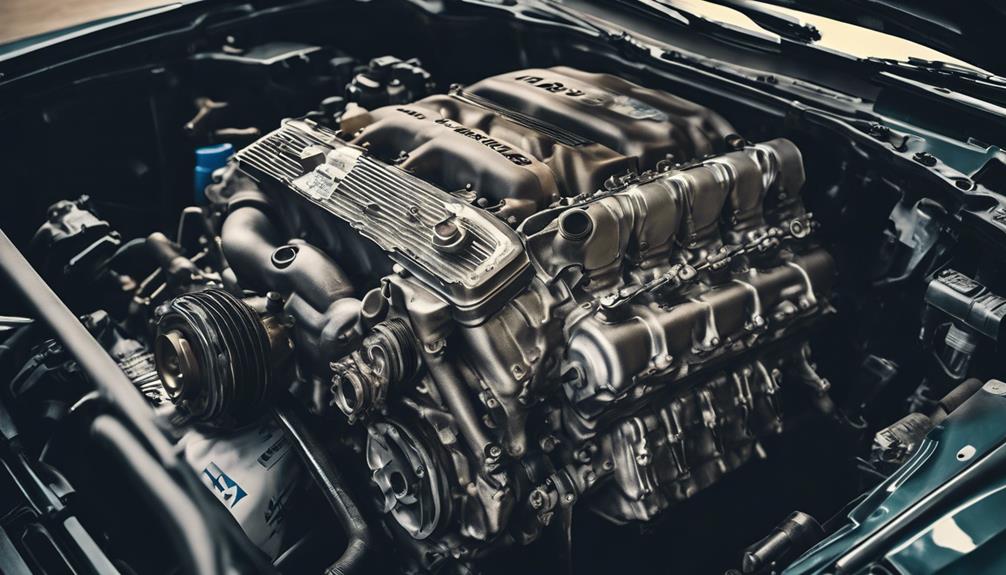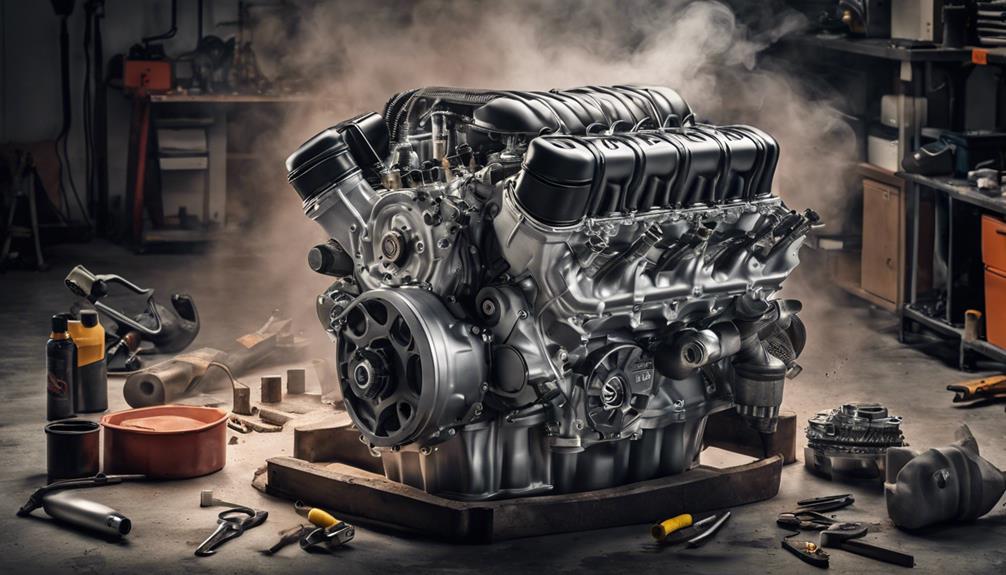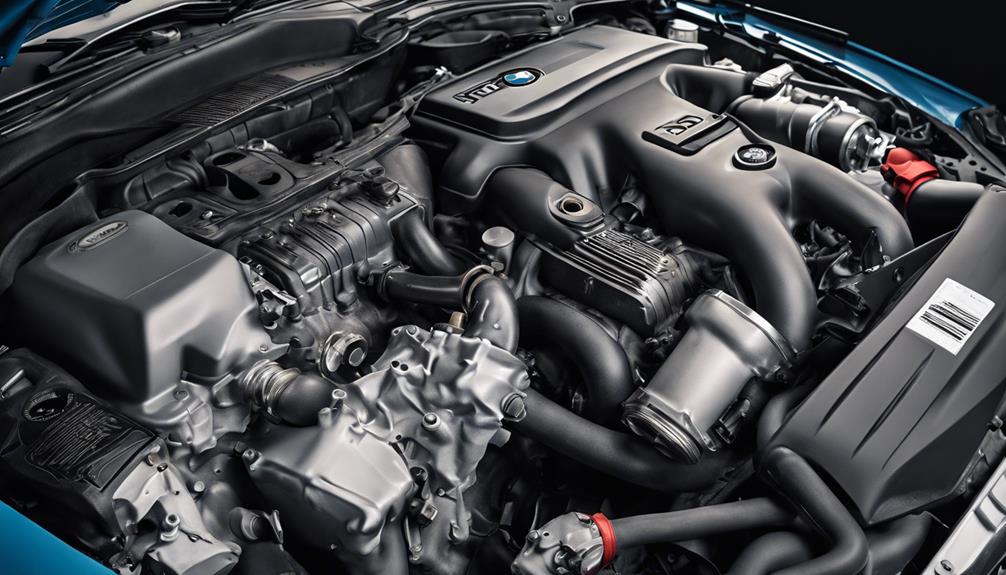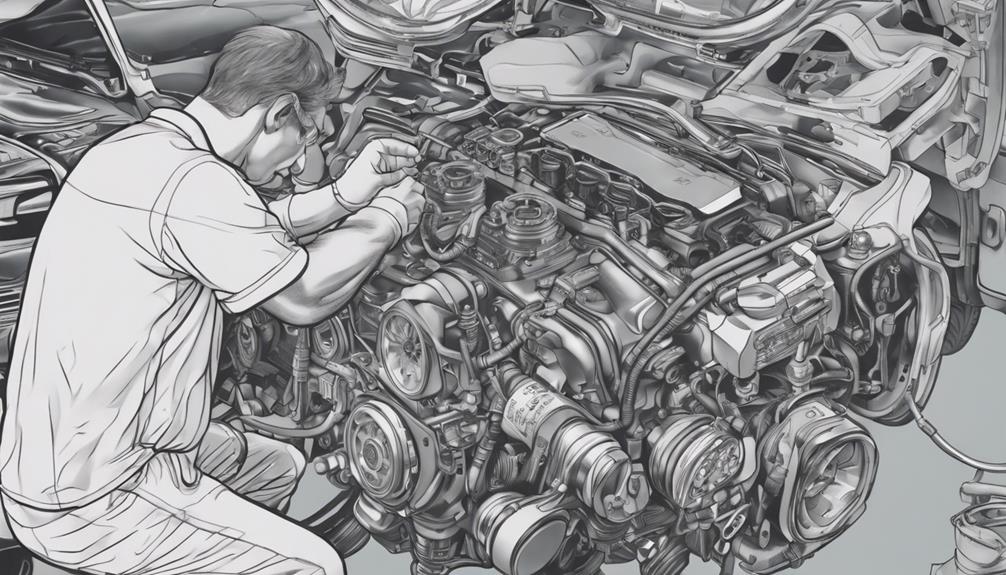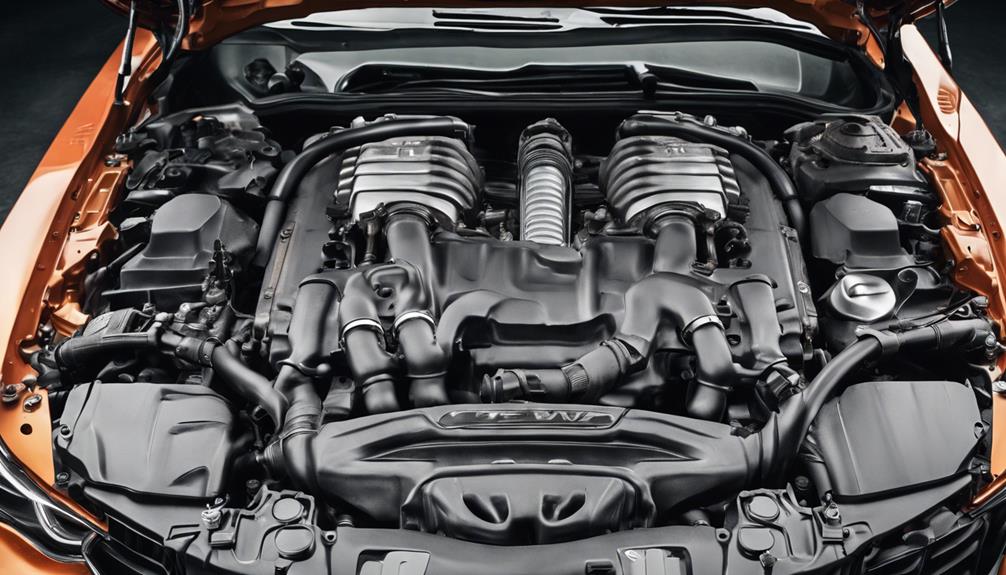If you own a BMW N47, be aware of common issues like timing chain wear, turbo wastegate problems, engine compartment hose issues, and fuel consumption increase. The timing chain wear may lead to engine failure if not addressed promptly, while turbo wastegate issues can affect fuel efficiency. Keep an eye on your engine hoses to prevent potential engine fires and ECU codes. Being proactive about maintenance can save you from costly breakdowns and enhance your BMW N47's longevity and performance. Understanding these common problems is essential for efficient preemptive maintenance.
Key Takeaways
- Timing Chain Wear is a common issue in BMW N47 engines.
- Turbo Wastegate Problems can lead to performance issues.
- Engine Compartment Hose Damage can trigger ECU codes and fires.
- Fuel Consumption Increase due to wastegate malfunctions.
- User Manual Importance for maintenance schedules and troubleshooting.
Timing Chain Wear
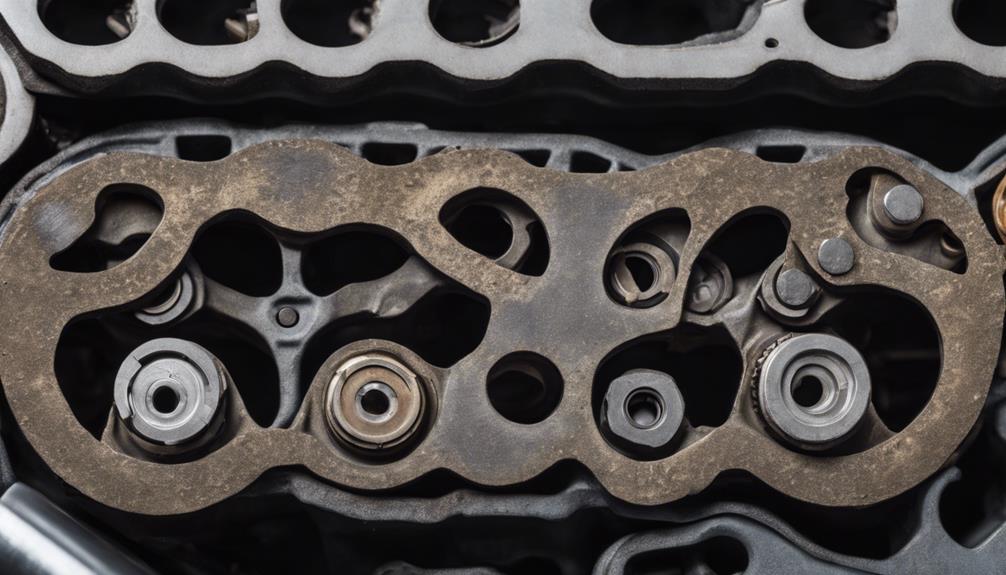
Excessive wear of the timing chain in your BMW N47 engine poses a significant risk of premature failure, a common issue known to manifest through a distinct metallic rattling noise.
The N47 engine family, particularly units produced between March 2007 and January 2009, has been plagued by excessive timing chain wear problems. This wear and tear on the timing chain can lead to catastrophic consequences, including engine failure and potential breakdowns.
Owners of BMWs equipped with the N47 engine should pay close attention to any unusual sounds, especially the metallic rattling noise that often signifies timing chain issues. It's vital to address this problem promptly to prevent further damage and avoid the inconvenience of unexpected breakdowns.
BMW acknowledged this issue by issuing a Quality Enhancement for certain vehicles with timing chain problems, underlining the significance of this issue within the N47 engine family.
Regular maintenance checks and prompt action upon hearing unusual engine noises can help mitigate the risk of premature failure due to timing chain wear.
Turbo Wastegate Problems
If you've noticed a rattling noise from the wastegate area in your BMW N47, it could indicate a potential issue with the wastegate. This rattling could lead to a loss of boost pressure, impacting the engine's performance.
Additionally, failure of the wastegate actuator can result in further complications, affecting fuel efficiency and overall engine operation.
Wastegate Rattle Issue
A common issue observed in the BMW N47 engine is the wastegate rattle problem, which stems from a lack of lubrication in the wastegate spring, leading to potential early failures. This problem can result in partial or full wastegate opening, causing a loss of compression in the engine. Additionally, the wastegate rattle issue is notorious for greatly increasing fuel consumption, sometimes up to 50%. Despite BMW acknowledging the turbo wastegate problem, owners have reported dissatisfaction due to the lack of compensation for the excessive fuel consumption experienced. Addressing this concern is essential to improve the overall ownership experience of BMW N47 engine users.
| BMW N47 Engine | Wastegate Rattle Issue |
|---|---|
| Lack of lubrication in wastegate spring | Potential early failures |
| Increased fuel consumption up to 50% | Loss of compression in the engine |
Boost Pressure Loss
Boost pressure loss due to turbo wastegate problems can greatly impact the performance and efficiency of the BMW N47 engine. Here are some key points to take into account:
- Lack of lubrication in the wastegate spring can lead to early failure and wastegate opening.
- Partial or full wastegate opening can result in loss of compression affecting engine performance.
- Turbo wastegate issues can cause a significant increase in fuel consumption, up to 50% in some cases.
- Dissatisfaction among owners with BMW's response to turbo wastegate problems has been common due to the lack of compensation for excessive fuel consumption reported.
These factors can contribute to decreased engine efficiency, higher fuel costs, and potential long-term issues like timing chain failure, especially in high mileage N47 engines prone to excessive engine oil consumption.
Wastegate Actuator Failure
Wastegate actuator failure in the BMW N47 engine can greatly impact its performance and efficiency, leading to various issues related to turbo wastegate problems. Lack of lubrication in the wastegate spring can cause premature failure, resulting in partial or full wastegate opening and potential engine compression loss.
Turbo wastegate issues can also lead to a significant increase in fuel consumption, sometimes up to 50%. Despite BMW acknowledging the problem, there have been reports of dissatisfaction among BMW owners due to the lack of compensation for excessive fuel consumption caused by wastegate failures.
It's crucial for BMW owners to be aware of these potential turbo wastegate problems to guarantee the proper functioning and longevity of their N47 engine.
Engine Compartment Hose Issues
Within the intricate network of components in the engine compartment of BMW N47 engines, the deterioration of hoses stands out as a critical issue. Here are some key points to keep in mind:
- Engine Control Unit (ECU) Codes:
Hose deterioration can trigger codes in the ECU without the Check Engine Light alerting you.
- Vacuum Hose Impact:
Damage to vacuum hoses can affect essential components like the Exhaust Gas Recirculation (EGR) cooler.
- EGR Cooler Buildup:
Hoses in poor condition can lead to buildup in the EGR cooler matrix, causing boost leaks and potentially resulting in engine fires.
- Recall Significance:
The 2018 recall of over 1.6 million BMW vehicles due to engine compartment hose problems highlights the severity and widespread nature of this issue.
Regularly inspecting and maintaining engine compartment hoses in BMW N47 engines is crucial. By staying proactive, you can prevent potential failures and avoid costly repairs down the line.
Fuel Consumption Increase
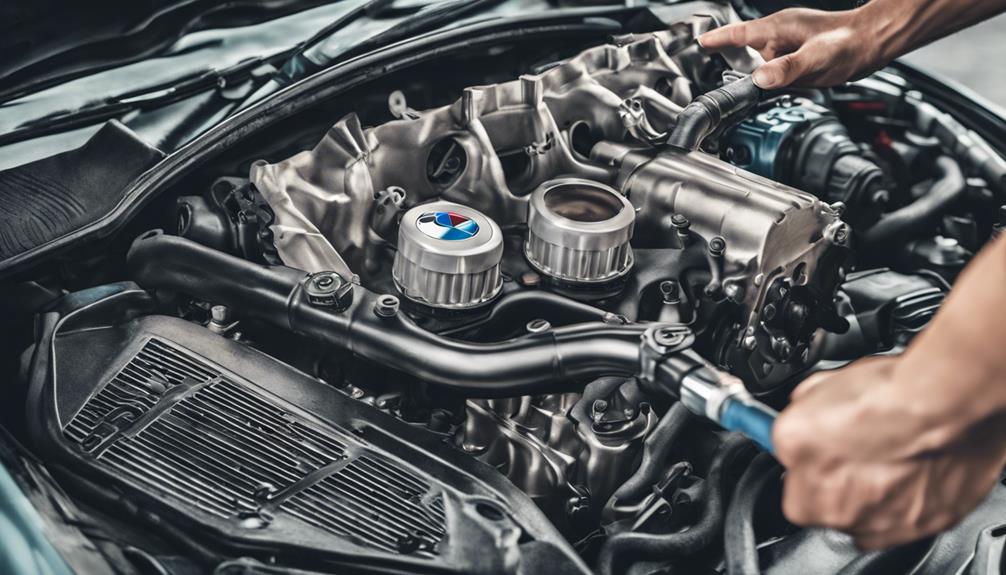
Inspecting and maintaining the turbo wastegate system is imperative in addressing the significant increase in fuel consumption observed in some BMW N47 engines. The lack of lubrication in the turbo wastegate spring can lead to early failure, causing partial or full wastegate opening and subsequently a notable rise in fuel usage. In some cases, these issues have resulted in up to a 50% increase in fuel consumption, causing dissatisfaction among owners. BMW has acknowledged the turbo wastegate problem but has not compensated owners for the excessive fuel consumption. Immediate action is recommended upon detecting a sudden spike in fuel consumption to prevent further damage and costly repairs. Below is a table summarizing key aspects related to the fuel consumption increase in BMW N47 engines:
| Aspect | Impact |
|---|---|
| Timing Chain | Potential wear due to increased engine load |
| Oil | Higher consumption due to engine stress |
| Failure | Turbo wastegate malfunction can lead to failure |
| Diesel Engine | Increased strain on the engine |
User Manual Importance
Understanding the importance of having a thorough user manual for the BMW N47 engine is crucial for maintaining peak performance and preventing common issues. Here's why the user manual holds significant value:
- Maintenance Schedules: The manual provides detailed maintenance schedules specific to the N47 engine, helping you stay on top of essential upkeep tasks.
- Troubleshooting Procedures: It contains step-by-step troubleshooting procedures tailored to the N47 engine, aiding in the early detection of problems.
- Unique Specifications: Important specifications unique to the N47 engine are outlined, empowering owners to better understand their vehicle.
- Preventative Measures: By following the instructions in the user manual, owners can proactively prevent common issues like timing chain failures, ensuring excellent engine functioning.
Regularly referencing your user manual can make a significant difference in the longevity and performance of your BMW N47 engine. It equips you with the knowledge needed to address issues promptly and maintain your vehicle effectively.
BMW Recalls
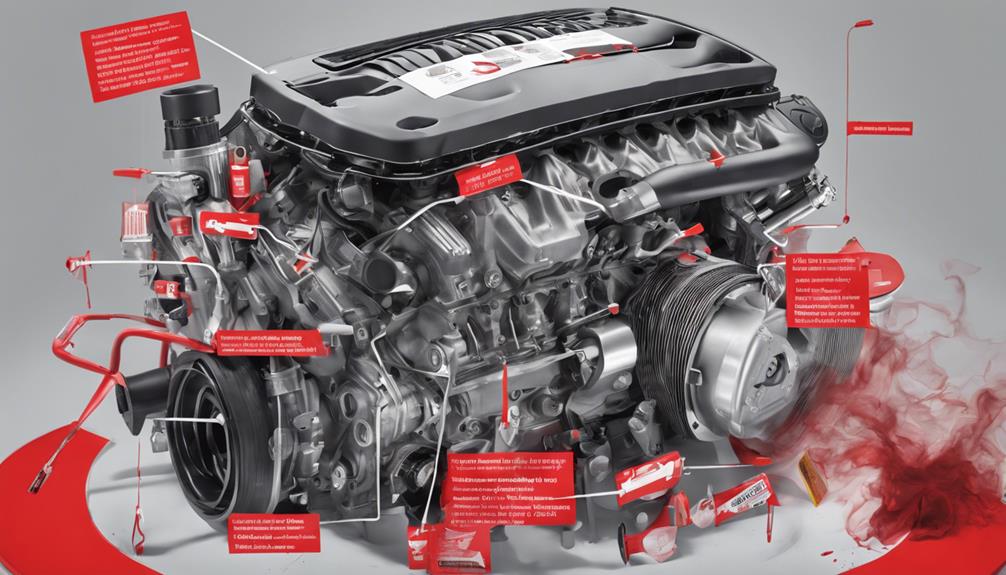
Referencing the user manual for your BMW N47 can provide valuable insights into addressing and preventing issues related to BMW recalls, such as the significant recall in 2018 due to engine compartment hose deterioration problems.
In 2018, BMW recalled over 1.6 million vehicles due to engine compartment hose issues, specifically related to vacuum hose damage impacting the Exhaust Gas Recirculation (EGR) cooler. These problems could trigger codes in the Engine Control Unit without illuminating the Check Engine Light, leading to potential engine fires from buildup in the EGR cooler matrix causing boost leaks.
Understanding the intricacies of your BMW N47, including components like the timing chain and potential Engine Light triggers, can help you stay proactive in addressing any recall-related concerns. By staying informed and proactive, you can effectively manage and prevent issues related to BMW recalls in your BMW CARS.
Frequently Asked Questions
What Is the Most Common Problem With the BMW N47?
The most common problem with the BMW N47 is excessive timing chain wear, often indicated by a metallic rattling noise. Vehicles produced between March 2007 and January 2009 are most affected. BMW issued a Quality Enhancement to address this issue.
Is the BMW N47 Reliable?
Yes, the BMW N47 is generally reliable when well-maintained and driven sensibly. Proper upkeep, like regular oil changes and attentive driving habits, can greatly extend the lifespan of the engine. Consider these factors for longevity.
What Year Did the Timing Chain Go Bad on the N47?
The timing chain in the BMW N47 engine started experiencing issues between March 2007 and January 2009. During this period, the timing chain displayed excessive wear and premature failure, potentially leading to severe engine damage.
How Long Will a N47 Engine Last?
A well-maintained N47 engine can last over 300,000 miles with regular oil changes every 9,000 miles. Sensible driving habits and timely servicing can help guarantee longevity. Remapping can also enhance performance and durability.
Conclusion
Overall, owning a BMW N47 comes with its fair share of common problems that owners should be aware of. From timing chain wear to turbo wastegate issues, being proactive in maintenance and addressing these issues promptly can help prevent costly repairs down the line.
Regularly referring to the user manual for recommended maintenance schedules and staying informed about BMW recalls can also help guarantee the longevity and performance of your vehicle.





